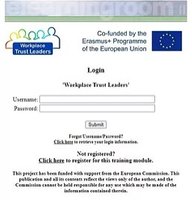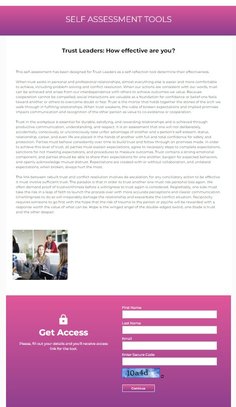WORKPLACE RELATIONSHIP SKILLS TRAINING
ON-LINE COURSES & SELF ASSESSMENT TOOLS
Healthy Workplace Leadership Course
Respect is at the heart of building any personal or business relationship; it is the glue that holds together the functioning of teams, partnerships, and relationships, laterally, vertically, internally, or externally. Respect for the right to differ is a paramount aspect of healthy relationships, but how this is handled is the trick.
The first step is to identify the specific areas of difference. When people prefer to relate in absolutes such as “right” and “wrong”, this creates a zero sum game of “I win” and “you lose.” When situations are viewed through this lens, a power struggle may ensue and the relationship is held hostage to a perceived victory or win over another person. When, however, a situation can be seen through the lens of tolerance for differences and a stated position is merely a matter of opinion, not fact, then cooperation, compromise, or collaboration is possible. Identifying and understanding differences allows people to shift their position from fiat to negotiation with a willingness to listen. The gift of good listening is in itself a sign of respect.
Respect leads to accepting a person for who and what she/he is; this acceptance creates an environment of trust, which can lead to a willingness to be open to new opportunities, new collaborations, strategies, ideas, products and improved relationships. If you can accept this, then implement techniques to avoid power struggles and non-productive conflict, which can drain energy from your effectiveness and divert your focus.
An Introduction to Conflict Management Skills
In this course we challenge you to think about your behavior in difficult situations and become aware of the behavior choices you have when conflict emerges. This course will help you have a better understanding of interpersonal conflict and build your conflict management skills. You will learn to apply some of the basic skills that Mediators use when mediating a conflict, and how you can use these skills to become more competent when dealing with the conflicts you experience when dealing with others.
We encourage you to think, listen, and see people and issues on a deeper level and in a different way. We want you to learn how to create synergy and make your workplace and your life more productive, collaborative and peaceful.
Throughout the course you will be prompted to visit the discussion room to learn and engage in conversation with others. It is important for you to take the time to review the brief tutorial about how to use the discussion room. The tutorials for the chat room and notepad features are optional, but recommended.
The Trust Leader Training Programme
The Trust Leader Training is presented in a series of self-contained online modules that can be taken individually, until the training is completed. Each module will address a specific topic. Collectively, when the modules have been completed, they will have enabled participants to have a solid understanding of the techniques and values of becoming a Trust Leader.
By having the training distributed through a series of self-contained modules participants will be able to access the information in a time-sensitive manner that fits their individual time constraints.
The online programme allows the participants to spread the learning over a number of sessions.
Upon completion of the entire series a participant will be
able to access and print a certificate showing that they
have successfully completed the training as a Trust Leader.
This process will allow the participants to have a better
understanding of themselves and their relationship styles.
SELF ASSESSMENT TOOLS
Interpersonal Needs in the Workplace
This self-assessment has been designed for the Trust Leader to identify how they view their workplace, interpersonal relationships, and how leadership addresses those workplace relationships. Conflict is often the messenger, not the problem, and how we deal with conflict becomes what people see and react to.
This assessment is a cultural snapshot for the Trust Leader to design a strategy of training and implementation to change the culture. Data gathered from this assessment can be useful to inform and educate decision makers on the value and need for appropriate training.
Trust Leaders: Effective Listening Assessment
This assessment is intended to offer the Trust Leader a quick assessment, with supporting discussion material, for training and reflection of their listening skills.
Just making an effort to look like a good listener is a psychological boost that assists in capturing the whole message - the attitude, the motivation, and the feelings behind the words. Communication is much more than talking and waiting to talk.
Trust Leaders: How effective are you?
This self-assessment has been designed for Trust Leaders as a self-reflection tool to determine their effectiveness.
When trust exists in personal and professional relationships, almost everything else is easier and more comfortable to achieve, including problem solving and conflict resolution. When our actions are consistent with our words, trust can be achieved and arises from our interdependence with others to achieve outcomes we value. Because cooperation cannot be compelled, social interactions are valuable as a foundation for confidence or belief one feels toward another or others to overcome doubt or fear. Trust is the mortar that holds together the stones of the arch we walk through in fulfilling relationships. When trust weakens, the rubble of broken expectations and implied promises impairs communication and recognition of the other person as value to co-existence or cooperation.
Workplace Culture Assessment
This self-assessment has been designed to measure your views on the culture of your workplace and whether it is a good place to work.
The results can be used by Trust Leaders to determine what action, if any, should be implemented. One thing is certain, like death and taxes, conflict is inevitable. It happens, and the workplace is a breeding ground for conflict. Consider that organizational culture consists of such things as shared values, beliefs, assumptions, perceptions, and norms, then add to that the fact that organizations are complex coalitions of individuals, departments, and divisions, each competing for scarce or limited resources, such as funding, access to those in authority, and time.
Healthy Workplace Leadership Course - £50
An Introduction to Conflict Management Skills - £50
The Trust Leader Training Programme - £50
Self Assessments - £25 (for all 4)
Interpersonal Needs in the Workplace
Trust Leaders: Effective Listening Assessment
Trust Leaders: How effective are you?
Workplace Culture Assessment






